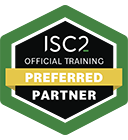category
Certified Information Systems Security Professional – Tier 3

Type
Virtual
Classroom ILT
Skill Level
Available dates
Learning Path
Virtual
Duration
1 Day

TYPE
Virtual
Classroom ILT
LEARNING PATH
SKILL LEVEL
DURATION
AVAILABLE DATES
Choose date
R27 000,00
Price excluding VAT
Tier 3
Pricing applicable to the following countries: Algeria, Angola, Botswana, Cameroon, Cape Verde, Cote d’Ivoire, Congo, Djibouti, Egypt, Gabon, Ghana, Lesotho, Libya, Mauritania, Mozambique, Morocco, Namibia, Nigeria, Saint Helena, Ascension and Tristan da Cunha, Senegal, Sudan, Swaziland, Tunisia, Zambia, Zimbabwe.
Introduction
In an increasingly complex cyber world, there is a growing need for information security leaders who possess the breadth and depth of expertise necessary to establish holistic security programs that assure the protection of organisations information assets.
CISSP is the most globally recognised certification in the information security market. Required by the world’s most security-conscious organisations, CISSP is the industry-leading credential that assures you have the deep technical and managerial knowledge and experience to effectively design, engineer, and manage the overall security posture of an organisation. The vendor neutral CISSP certification is the ideal credential for those with proven deep technical and managerial competence, skills, experience, and credibility to design, engineer, implement, and manage their overall information security program to protect organisations from growing sophisticated attacks.
Backed by ISC2, the globally recognised, non-profit organisation dedicated to advancing the information security field, the CISSP was the first credential in the field of information security to meet the stringent requirements of ISO/IEC Standard 17024. Not only is the CISSP an objective measure of excellence, but also a globally recognised standard of achievement.
Audience Profile
This training course is intended for professionals who have at least 5 years of recent full-time professional work experience in 2 or more of the 8 domains of the CISSP CBK and are pursuing CISSP training and certification to acquire the credibility and mobility to advance within their current information security careers. The training course is ideal for those working in positions such as, but not limited to:
|
|
|
|
|
|
|
|
|
|
Pre-requisites
- Candidates must have a minimum of five years cumulative paid work experience in two or more of the eight domains of the ISC2 CISSP Common Body of Knowledge (CBK)
- Earning a four-year college degree or regional equivalent in Computer Science, Information Technology (IT) or related fields or an additional credential from the ISC2 approved list will satisfy one year of the required experience
- Education credit will only satisfy one year of experience
- Part-time work and internships may also count towards your experience
- Full-Time Experience: Your work experience is accrued monthly
Thus, you must have worked a minimum of 35 hours/week for four weeks to accrue one month of work experience:
- Part-Time Experience: Your part-time experience cannot be less than 20 hours a week and no more than 34 hours a week
- 1040 hours of part-time = 6 months of full-time experience
- 2080 hours of part-time = 12 months of full-time experience
- Internship: Paid or unpaid internship is acceptable. You will need documentation on company/organisation letterhead confirming your position as an intern. If you are interning at a school, the document can be on the registrar’s stationery
What is included?
- Official ISC2 Digital Student Kit
- Course Evaluation
- Post Course Assessment and Answer Key
- Certificate of Completion
Note: An official ISC2 printed student book can be provided as a special order at an additional cost, which will be borne by the client. The turnaround time for delivery of printed books is 10–15 working days from the date of order.
Course Objectives
On completion of this program, the participants will be able to:
- Apply fundamental concepts and methods related to the fields of information technology and security
- Align overall organisational operational goals with security functions and implementations
- Determine how to protect assets of the organisation as they go through their lifecycle
- Leverage the concepts, principles, structures, and standards used to design, implement, monitor, and secure operating systems, equipment, networks, applications, and those controls used to enforce various levels of confidentiality, integrity, and availability
- Apply security design principles to select appropriate mitigations for vulnerabilities present in common information system types and architectures
- Explain the importance of cryptography and the security services it can provide in today’s digital and information age
- Evaluate physical security elements relative to information security needs
- Evaluate the elements that comprise communication and network security relative to information security needs
- Leverage the concepts and architecture that define the associated technology and implementation systems and protocols at Open Systems Interconnection (OSI) model layers 1–7 to meet information security needs
- Determine appropriate access control models to meet business security requirements
- Apply physical and logical access controls to meet information security needs
- Differentiate between primary methods for designing and validating test and audit strategies that support information security requirements
- Apply appropriate security controls and countermeasures to optimize an organisation’s operational function and capacity
- Assess information systems risks to an organisation’s operational endeavors
- Determine appropriate controls to mitigate specific threats and vulnerabilities
- Apply information systems security concepts to mitigate the risk of software and systems vulnerabilities throughout the systems’ lifecycles
Course Content
| Chapter 1: The Information Security Environments | |
|
|
|
|
|
|
| Chapter 2: Information Asset Security | |
|
|
|
|
|
|
| Chapter 3: Identify and Access Management (IAM) | |
|
|
|
|
|
|
| Chapter 4: Security Architecture and Engineering | |
|
|
|
|
|
|
|
|
|
|
|
|
| Chapter 5: Communication and Network Security | |
|
|
|
|
|
|
|
|
| Chapter 6: Software Development Security | |
|
|
|
|
|
|
|
|
| Chapter 7: Security Assessment and Testing | |
|
|
|
|
|
|
| Chapter 8: Security Operations | |
|
|
|
|
|
|
| Chapter 9: Putting It All Together | |
|
|
|
|
|
|
| Exam Domains |
| Domain 1: Security and Risk Management |
| Domain 2: Asset Security |
| Domain 3: Security Architecture & Engineering |
| Domain 4: Communication and Network Security |
| Domain 5: Identity and Access Management (IAM) |
| Domain 6: Security Assessment and Testing |
| Domain 7: Security Operations |
| Domain 8: Software Development Security |
Benefits of CISSP
For the individual:
- Instant credibility and differentiation: Positioned as an authority figure on cybersecurity, proving proficiency to keep up with new technologies, developments and threats. Quickly conveys knowledge and inspires trust
- Unique recognition: The highest standard for cybersecurity expertise. It’s vendor-neutral, accredited and requires both practical knowledge and professional experience to earn
- Enhanced knowledge and skill set: Advanced knowledge and skills to stay ahead of cybersecurity best practices, evolving technologies and mitigation strategies
- Versatility: Vendor-neutral and multivendor knowledge can be applied across different technologies and methodologies, increasing marketability and ensuring ability to protect sensitive data in a global environment
- Career advancement: Raises visibility and credibility, improves job security and creates new job opportunities
- Increased compensation: Depending on country and employer. On average, ISC2 members report having 35% higher salaries than non-members
For the Organisation:
- Secure the organisation’s critical data: Strengthen the security posture with qualified professionals who have proven expertise to competently design, build and maintain a secure business environment
- Increase overall cybersecurity IQ: Implement the latest security best practices
- Improve cybersecurity coherence across the organisation: Ensure professionals speak the same language across disciplines and have cross-department perspective
- Instant respect and credibility: Increase organisational integrity in the eyes of clients and other stakeholders
- Satisfy requirements: Meet certification mandates for service providers and subcontractors
- Stay current: Ensure work teams are up to date on emerging and evolving technologies, threats and mitigation strategies by meeting ISC2 Continuing Professional Education (CPE) requirements
- Governance, Risk and Compliance: Comply with government or industry regulations (DoD 8140.01/8570.01 approved)
Associated Certifications and Exam
The CISSP draws from a comprehensive, up-to-date, global common body of knowledge that ensures security leaders have a deep knowledge and understanding of new threats, technologies, regulations, standards, and practices. Security Operations
Associate of ISC2: A candidate who doesn’t have the required experience may become an Associate of ISC2 by successfully passing the CISSP examination. The Associate of ISC2 will then have six years to earn the five years of cumulative paid work experience in two or more of the eight domains of the ISC2 CISSP Common Body of Knowledge (CBK).
On successful completion of this course students will receive a Torque IT attendance certificate.

ISC2 Overview
In an increasingly complex cyber world, there is a growing need for information security leaders who possess the breadth and depth of expertise necessary to establish holistic security programs that assure the protection of an organisations information assets.
ISC2 is an international non-profit membership association focused on inspiring a safe and secure cyber world. Today, based in the United States, ISC2 serves its global membership from its headquarters in Alexandria, Virginia, along with a portfolio of credentials and world-class education programs in the form of vendor-neutral education products and career services.
Best known for the acclaimed Certified Information Systems Security Professional (CISSP®) certification, ISC2 offers a portfolio of credentials that are part of a holistic, programmatic approach to security.
ISC2 members, candidates and associates, nearly 675,000 strong, are made up of certified cyber, information, software and infrastructure security professionals who are making a difference and helping to advance the industry. ISC2 members represent an elite, global network of dedicated cybersecurity professionals – preeminent experts in their field – who have committed themselves to the highest ethical standards and best practices. All members are certified professionals who have passed ISC2 examinations attesting to skill and knowledge in their field. Through their ISC2 certification, they have demonstrated superior competency and devoted themselves to making the cyber world a safer place for all.
Torque IT is the longest standing Official Training Partner (OTP) in South Africa and has maintained the status of one of the leading ISC2 accredited training organizations in South Africa. Torque IT remains the Only Preferred OTP in the South Africa. As a leading and established training provider of cybersecurity education and certification, Torque IT is committed to expanding our offerings and promoting cybersecurity awareness and expertise across all ISC2 Certifications and throughout South Africa and various African countries.
